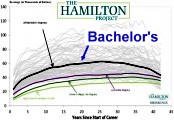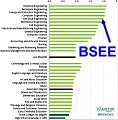|
 Not
many people would argue that earning a college degree does not statistically portend higher lifetime earnings, and
that the more degrees you have, the higher your income is likely to be. Sure, lots of people become very successful
with little more than a high school diploma, but almost without exception they do it by starting their own business
and figure out how to exploit their natural talents in a big way. You don't need a college degree to open a chain
of auto lube stations, an electrical or plumbing contracting business, a lawn maintenance empire, or a few pizza parlors.
Some do require special licensing and some take more seed money than others, but almost anyone with know-how and ambition
can make a go of it. Not everyone is cut out for self-employment, not everyone wants to own a business, and some jobs
require the vast resources that only an established company can provide; e.g., aircraft or auto design, nuclear power
plant design, surgical nursing, and Wall Street pit trading. Not
many people would argue that earning a college degree does not statistically portend higher lifetime earnings, and
that the more degrees you have, the higher your income is likely to be. Sure, lots of people become very successful
with little more than a high school diploma, but almost without exception they do it by starting their own business
and figure out how to exploit their natural talents in a big way. You don't need a college degree to open a chain
of auto lube stations, an electrical or plumbing contracting business, a lawn maintenance empire, or a few pizza parlors.
Some do require special licensing and some take more seed money than others, but almost anyone with know-how and ambition
can make a go of it. Not everyone is cut out for self-employment, not everyone wants to own a business, and some jobs
require the vast resources that only an established company can provide; e.g., aircraft or auto design, nuclear power
plant design, surgical nursing, and Wall Street pit trading.
Even if you earn a degree in a certain field of study and end up working in a completely unrelated job, your degree
will likely earn you bonus points when applying for promotions or different positions within the company, and your
more exposure to the rigors of studying and learning about a wide berth of subjects makes you more flexible and able
to take on new assignments ... in theory, anyway. I distinctly recall back in the early 1990s when many engineers
were losing their jobs that anecdotes by former engineers appeared in EE Times and other magazines telling
of how they were laid off and ended up making more money by driving taxi cabs or by starting a home improvement business.
By the mid-to-late 1990s engineers were turning to day trading and Y2K coding right up until the 'Dot-com
Bubble" burst in spring of 2000, half a year prior to that year's presidential election
(remember the 'hanging chads?'
Ebola czar
Klain was the lawyer behind it).
In order to attempt to quantify just how much an increase in lifetime earnings a college degree equates to, The
Hamilton Project did a study titled "Major
Decisions: What Graduates Earn Over Their Lifetimes." "Drawing upon data from the Census Bureau's
American Community Survey, we examine earnings for approximately
80 majors, focusing on both annual earnings for each year of the career and cumulative lifetime earnings." I won't
bother to reproduce all their findings here when you will receive a better story directly from
the source. However, I will point out some key findings:
-
 "Looking
at cumulative earnings over the entire career, the typical bachelor's degree graduate worker earns $1.19 million,
which is twice what the typical high school graduate earns, and $335,000 more than what the typical associate degree
graduate earns." "Looking
at cumulative earnings over the entire career, the typical bachelor's degree graduate worker earns $1.19 million,
which is twice what the typical high school graduate earns, and $335,000 more than what the typical associate degree
graduate earns."
- "Majors that emphasize quantitative skills tend to have graduates with the highest lifetime earnings. The highest-earning
majors are those in engineering fields, computer science, operations and logistics, physics, economics, and finance."
- Chemical engineers earn the most money, followed in order by Aerospace, Energy & Extraction, Computer, Electrical,
and Mechanical Engineering.
They have an interactive lifetime earnings comparison applet for comparing different college majors and levels
of education, but it's pretty useless IMHO.
A report by
College Board shows average debt by BS degree graduates is increasing, but it does not look devastating by today's
standards: $14,300. That's the price of a decent mid-2000s vintage used car. That number doesn't even come close to
jiving with 'the sky is falling' reports of students graduating with $100k student loans to pay off. Somebody's lying.
That said, here are a few recognizable names of
extremely rich people
who never graduated from college:
- Mark Zuckerburg, Facebook
- Michael Dell, Dell Computers
- Ted Turner, Time Warner
- Larry Ellison, Oracle
- Bill Gates, Microsoft
- Steve Jobs, Apple Computer
- Richard Branson, Virgin Records | Airways | Mobile
- Andrew Carnegie, Carnegie Steel
- Dave Thomas, Wendy's
- George Eastman, Eastman Kodak
- Thomas Edison, Edison General Electric
- John D. Rockefeller, Sr., investor
Posted November 10, 2014
|



